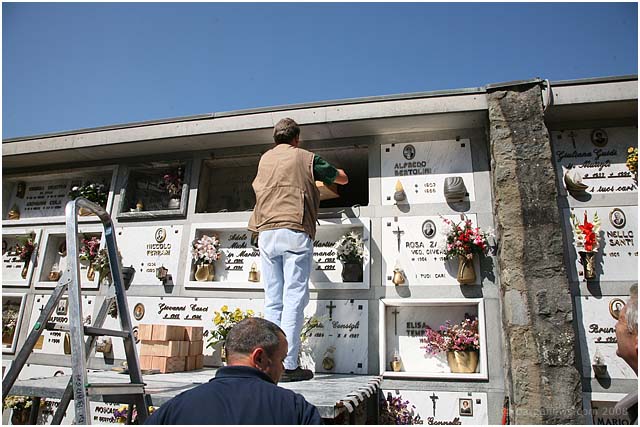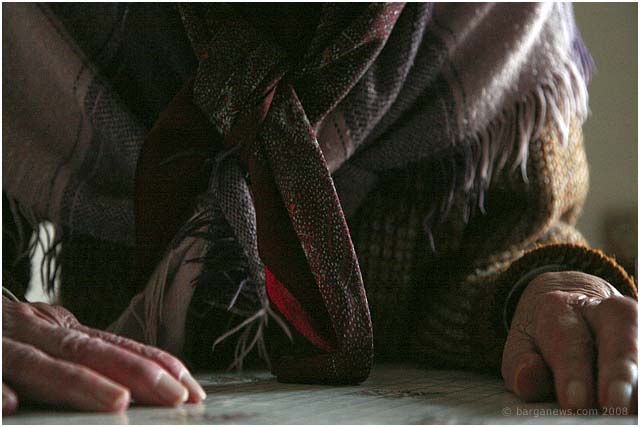A moving ceremony this morning as Antonietta Paoletti’s ashes were returned to Barga and laid to rest in the Barga Cemetery. Antoinette died last month in Scotland but her last wish was that she would be returned to her beloved Barga.
The city has become over the last 10 years accustomed to official ceremonies in two languages; marriage services are quite often bilingual and there are even bilingual signs advising people in Barga Vecchia about rubbish collection but this was probably the first bilingual funeral service.
The many friends of Antonietta who kept her company at Aristo’s bar were represented by Brian Brown who read out in English a short but distinct request to the assembled people not to mourn her death but to celebrate her life.
Another of her daily companions in the piazza, Graziella Cosimini read the Italian translation of the article written by Frank Viviano which was published in barganews the day of her death. (article here)
A copy of a poem* written for Antonietta by Piergiuliano Cecchi was placed on the casket containing her ashes just before her final resting place was sealed.
Probably the most poignant summing up was the card handed out to people attending the service which had on one side a colour photograph of Antonietta and just four words on the reverse ” A life without fuss!”
Antonietta Blesnuk Paoletti was a survivor. You knew it the moment you met her intense, unwavering gaze. You could read it in her weathered and eloquent hands. You heard it in her ribald laugh, in the way she enjoyed an off-color joke and the comical theatrics of flirtation. For more than eight decades, she wore her immense attachment to life as a shawl against all adversity.
Too often, we treat the vecchi signori e signore who pass us in the streets as symbols, caricature grandpas and grandmas. Yet each of them can tell us a powerfully individual story, if we take the time to listen. Antonetta’s story had the passion and drama of an epic.
Her journey to Barga began far to the east, on June 22, 1941. Early that morning, Hitler’s Operation Barbarossa, the largest single military assault in history, swept into Antonietta’s native Ukraine with 190 Axis divisions, an army of 3.5 million. By January 1942, Antonietta herself was part of an army of nearly 3 million slaves headed in the opposite direction – marched under armed guards to forced labor camps in Germany, where most of them would die. She was 16 years old.
Sometimes, in a quiet moment at Aristo’s caffe, she would speak of the horrifying years before her liberation. The only thing that kept her alive, she once told me, was love. She’d met a young Italian in the camp, a frail but determined fellow slave from the small village of Filecchio near Barga. They clung to each other through the indescribable fury and slaughter of the Third Reich’s collapse. Then they walked home together to the Serchio Valley. Six months later her husband was dead of tuberculosis. Antonietta, still a teenager, was a widow.
She married again, into the Paoletti family, had a son, and worked for eight years in the metallurgy plant at Fornaci. In the 1950s, the family emigrated to Dumfries, Scotland – the home of Robert the Bruce and Robert Burns – where she worked 18 years more in a textile mill. Widowed again and a pensioner, she returned to Barga in the 1980s. It was the “luogo del mio cuore,†she said, “the home of my heart.â€
Many of us with our own hearts in Barga lost them to Antoinetta, (more here) listening to her laughter, punctuated only now and then by the memories of a war that altered everything for her. She was too alive, too enamored of the world, to dwell on its terrible sorrows. Too fierce to imagine surrender. Her other great love, her son Nello, understood that, and waited to bring his mother back to Scotland until cancer left no choice. She died on June 21, almost 67 years to the day after Operation Barbarossa.
— Frank Viviano
ANTONETTA
Antonetta Blesnuk Paoletti era una sopravvissuta – Lo percepivi nel momento in cui incontravi il suo sguardo intenso, fermo.
Lo potevi leggere nelle sue mani segnate dal tempo, capaci di parlare.
Lo coglievi nella sua risata dissacrante, nel modo in cui si divertiva a scherzare e a recitare la parte della seduttrice. Per più di otto decadi il suo attaccamento alla vita, indossato come uno scialle, l’ ha
difesa contro ogni avversità . Troppo spesso noi siamo portati a trattare i vecchi signori e signore che passano per strada come simboli, caricature di nonni e nonne. Eppure ciascuno di loro potrebbe
raccontare una propria storia straordinaria, se ci prendessimo il tempo di ascoltare. La storia di Antonetta aveva la passione e il dramma di un racconto epico.
Il suo viaggio per Barga ebbe inizio da molto lontano, dall’ Est, il 22 giugno 1941.
Al mattino presto nell’ ambito dell’ Operazione Barbarossa di Hitler, l’ operazione militare più
intensa nella storia, 190 divisioni dell’ Asse, un esercito di 3,5 milioni, mossero rapidamente alla volta dell’ Ucraina, il paese nativo di Antonetta.
Dal gennaio 1942 anche Antonetta fece parte di un esercito di quasi 3 milioni di schiavi, in marcia sotto scorta armata, guidati in direzione opposta verso i campi di lavoro forzato, in Germania, dove la maggior parte di loro sarebbe morta.
Lei aveva 16 anni.
Talvolta, al caffé dell’ Aristo, durante i momenti di tranquillità , le piaceva parlare degli anni terribili prima della liberazione. La sola cosa che la tenne in vita, mi disse una volta, fu l’ amore.
Nel campo aveva incontrato un giovane italiano, un compagno di schiavitù, fragile ma deciso, originario di Filecchio, un piccolo villaggio vicino Barga. Si tennero stretti l’ uno all’ altro in mezzo all’ indescrivibile furia e carneficina del crollo del 3° Reich.
Insieme poi, a piedi, tornarono a casa in Val di Serchio. Sei mesi più tardi suo marito morì di tubercolosi. Antonetta ancora adolescente, era una vedova.
Si sposò ancora con un Paoletti, ebbe un figlio e per otto anni lavorò nello stabilimento metallurgico di Fornaci.
Negli anni ‘50 la famiglia emigrò a Dumfries, in Scozia, la patria di Robert The Bruce
e Robert Burns, dove lavorò per più di 18 anni in un’ industria tessile. Di nuovo rimasta vedova e in età di pensione, negli anni ‘80 ritornò a Barga. Era il luogo del mio cuore, diceva, la casa del mio
cuore.
Anche noi, per i quali Barga è il luogo del cuore, abbiamo riservato un angolo di esso ad Antonetta, dove sentiamo risuonare la sua risata punteggiata qua e là dai ricordi di una guerra che a lei
aveva cambiato tutto. Lei era troppo viva, troppo innamorata del mondo per indugiare nelle sue terribili tristezze. Troppo fiera per immaginare di arrendersi. Suo figlio Nello, l’ altro suo grande amore
aveva capito questo e ha aspettato a riportare sua madre in Scozia fino a che il cancro non le ha lasciato scelta.
Antonetta è morta il 21 giugno quasi a 67 anni dal giorno dopo l’ Operazione Barbarossa.
Frank Viviano (Traduzione italiana di Graziella Cosimini)
* that Poem ” “L’ ULTIMO SOGNO DI ANTONIETTA†wriiten by Piergiuliano Cecchi can be downloaded here




